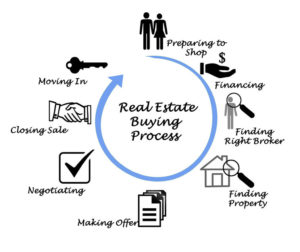COVID-19 Real Estate Home Buying Process
With the current COVID-19 pandemic, the federal government has labeled residential and commercial real estate as an essential business. Yet, COVID-19 has changed how real estate is conducted not only with how Realtors are showing properties but also how real estate transactions are closed.
One thing is certainly sure: being an “essential” business does not necessarily mean business as usual.
Pre-Closing
The New National Association of Realtors (NAR) guidelines follow and strictly adhere to all CDC safety guidelines. NAR supports and encourages that all brokerage firms order their agents to shelter in place and avoid all social interaction.
Such stay at home mandates and social distancing regulations have pushed real estate agents to become creative. Instead of having open houses, real estate agents are using virtual property showings, and Facebook live open houses. There are programs for customers to even design their home using digital tools, watching videos of the construction as their property is being built. Realtors are doing initial showings over video chat services like Face Time, Skype or Zoom.
Contract
Perhaps the real challenge COVID-19 poses to home buying is not necessarily shopping for the home—rather, it is closing on one.
Issues with contracts focusing on force majeure clauses, or clauses that provide for a delay or opportunity to get out of underlying obligations in the event of unforeseen or uncontrollable events have been an emerging issue during this pandemic.
The development of the COVID-19 Extension Addendum to Contract allows for time periods and dates to be extended as a result of the Corona-virus pandemic.
Closing
Once contract issues are overcome, the closing itself has evolved due to this crisis.
Make sure that you or the Seller only use an escrow and Title company that is capable of handling the closing. Specifically ask whether they use online or mobile notaries. Also determine if the local recorder’s office uses electronic recording and whether the title company is equipped to record the deed electronically.
Many documents in the closing process require a notary, and notarization is normally required to be done-in person. The Florida legislature and Governor signed into law effective January 1, 2020, a new law that allows for what is called remote online notarization (RON). This is a huge game-changer in the State of Florida, particularly in the area of real estate closings. No longer do parties all have to get together at a certain set time around the conference room and execute documents. Now, from the comfort of your own home, provided that you have your own laptop or smart phone, you can execute documents online and remotely and have those documents notarized. While the technology is new, it is not that new. It is the same technology that is used to validate your passport or driver’s license when you go through security at an airport. This validation technology is now being used for remote online notarization (RON).
If, for example, you are in another state and are closing on real estate located in Florida, or, perhaps, you are in a profession (such as being a doctor and on call) that makes it difficult to attend a closing, you can now remotely video into the closing and notarize your documents from the comfort wherever you might be. Documents are produced online for your review, and at the point that you are prepared to execute those documents, you can do so remotely. A notary is present at the time online, not physically with you, and that notary is then able to confirm and validate that you executed the documents without any duress or coercion.
There is a caveat, however, and that is that while remote online notarization, in theory, should work all over the world, it really is more of a domestic service for people within the United States. It is difficult for the technology, at this stage, to validate foreign credentials.
Appraisals and home inspections are other aspects of residential real estate closings are evolving during this pandemic. The Federal Housing Finance Agency is allowing alternative appraisal methods such as “drive by” appraisals where appraisers drive through the neighborhood and walk around a property without going into it. They are also doing “desktop” appraisals using public data to generate property values.
The loan process will likely take longer than in the past and I am encouraging my buyers to agree to no less than a 60 days closing if a loan is needed. You need to take this into consideration with your home buying timeline if you need to close on a property by a certain date.
Moving during a Pandemic
I recently published an entire BLOG article on this subject which you can read here along with other articles that you may find informative.




 Kim N. Bregman
Kim N. Bregman